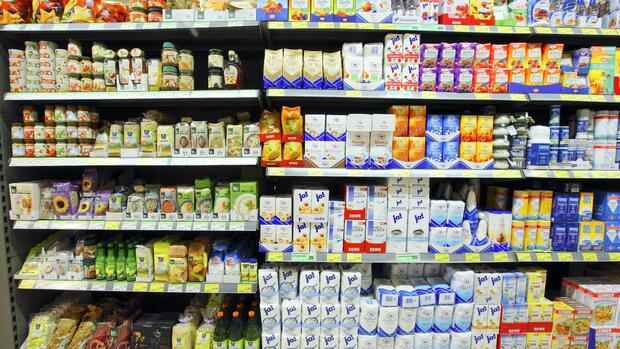Food cost an average of 6.0 percent more in December.
(Photo: imago images/Jochen Tack)
Berlin The rising prices for many goods in Germany are increasingly burdening consumers. According to a Yougov survey commissioned by Postbank, every ninth German says they can hardly pay their living expenses. The results, which the German Press Agency first reported, are available to the Handelsblatt.
Of those surveyed from households with a monthly net income of less than 2,500 euros, as many as 17 percent stated that they were hardly able to cope with regular expenses due to higher prices. Seven percent of respondents with higher incomes said they would face financial hardship because of inflation.
The inflation rate in Germany has increased noticeably in recent months. Consumer prices in December were 5.3 percent above the level of the same month last year, as the Federal Statistical Office announced last week. In 2021 as a whole, the inflation rate was 3.1 percent.
In the crisis year 2020, some prices had fallen, so some of the current price increases merely represent normalization. The price increase in December compared to the previous month was only 0.5 percent, which, however, also means clear growth. Certain goods, above all energy sources such as gas and electricity, have also experienced a price rally that goes far beyond normalization.
Top jobs of the day
Find the best jobs now and
be notified by email.
“Since food, energy and fuel have become significantly more expensive, but incomes cannot keep up with price developments, the financial scope is shrinking,” says Postbank chief economist Marco Bargel.
Price expectations remain high
Almost half of Yougov’s 2,102 respondents said they were “very concerned” about high inflation rates. A growing group, around a quarter of those surveyed, said they could not save anything.
A quick end to the price increases is not in sight. The price expectations that the Ifo Institute regularly surveys fell only slightly in December and are just below the historic high of the previous month.
“This will have an impact on consumer prices,” says Timo Wollmershäuser, Ifo business manager. The companies would pass on the increased costs for energy and for the procurement of primary products and merchandise.
The research institutes and the Bundesbank have recently revised their inflation forecasts for the current year significantly upwards. The Ifo Institute expects inflation to average 3.5 percent in 2022. In the first few months you will still be over four percent, but the rates will then gradually drop.
A prerequisite for this scenario is relaxation on the energy markets and in international trade. While the pandemic has created high demand for goods such as electronics and energy, trade in goods is still restricted.
Forecasts subject to uncertainty
In combination, the price increases have resulted. It is expected that the trade problems will resolve in the summer and that the demand for services will increase once the corona situation eases, which would normalize the demand for goods.
The further development of inflation also depends on the development of wages. If the trade unions want to compensate for the dwindling purchasing power with higher wages, this can have a stimulating effect. However, such a wage-price spiral is not in sight.
“We expect collective wages to increase by almost two and a half percent this year and next. That would then be as strong as the average of the years before the corona crisis,” says Wollmershäuser. In 2021, according to the Federal Statistical Office, negotiated wages only rose by around 1.3 percent.
However, economists are increasingly pointing out that the inflation forecasts are currently subject to great uncertainty and that a longer phase of higher price increases cannot be ruled out.
More: Three reasons why inflation could remain higher than everyone thinks

